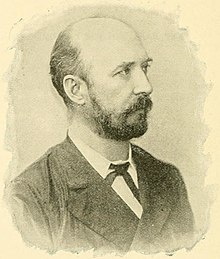Sir Robert Hart, 1st Baronet
|
Sir Robert Hart, 1st Baronet GCMG |
|
|---|---|
 |
|
| 2nd Inspector-General of the Chinese Maritime Customs Service | |
|
In office 15 November 1863 – 20 September 1911 |
|
| Monarch |
Tongzhi Emperor Guangxu Emperor Xuantong Emperor |
| Preceded by | Horatio Nelson Lay |
| Succeeded by | Francis Aglen |
| Personal details | |
| Born | 20 February 1835 Portadown, County Armagh, Ulster, Ireland |
| Died | 20 September 1911 (aged 76) |
| Resting place | Bisham, Berkshire, England |
| Nationality | British |
| Alma mater | Queen's College, Belfast |
Sir Robert Hart, 1st Baronet GCMG (20 February 1835 – 20 September 1911), was a British diplomat in China, who served as the second Inspector-General of China's Imperial Maritime Custom Service (IMCS) from 1863 to 1911.
According to Jung Chang, "Under Hart, Chinese Customs was transformed from an antiquated set-up, anarchical and prone to corruption, into a well-regulated modern organisation, which contributed enormously to China's economy."
Hart was born in a little house in Dungannon Street, Portadown, County Armagh, Ulster, Ireland. He was the eldest of 12 children of Henry Hart (1806–1875), who worked in the distilleries, and a daughter of John Edgar of Ballybreagh. Hart's father was a "man of forceful and picturesque character, of a somewhat unique strain, and a Wesleyan to the core." At the age of 12, Hart's family moved to Milltown (near Maghery), on the banks of the Lough Neagh, staying there for a year before moving on to Hillsborough, where he first attended school. He was sent for a year to a Wesleyan school in Taunton, England, where he learnt his first Latin. His father's anger at being allowed to return to his home unaccompanied at the end of the school year led him to be sent to the Wesleyan Connexion School in Dublin (now Wesley College Dublin) instead.
Hart studied hard at school, earning him the nicknames "Stewpot" and "Consequential Butt". By the age of 15, he was ready to leave school, and his parents decided to send him to the newly founded Queen's College, Belfast. He easily passed the entrance exams and earned himself a scholarship (he earned another scholarship in second year, and another in third). He found little time for sports, but was heavily influenced by Ralph Waldo Emerson's Essays and had his first poem published in a Belfast newspaper. During his time at university, he became a favourite student of James McCosh, and they continued to correspond through the rest of their lives. In 1853, he took his degree examinations, and gained his B.A. at the age of 18. He also won medals in Literature as well as in Logic and Metaphysics, and left with the distinction of being a Senior Scholar. He decided to study for a master's degree but in spring 1854 was instead nominated by Queen's College for the Consular Service in China.
...
Wikipedia
